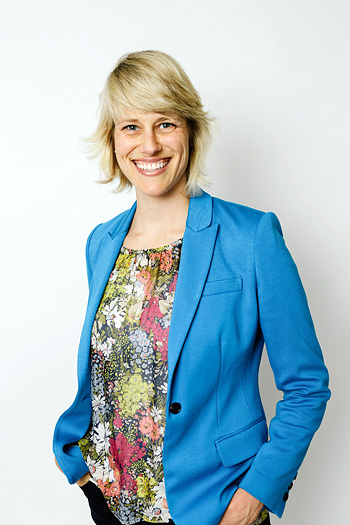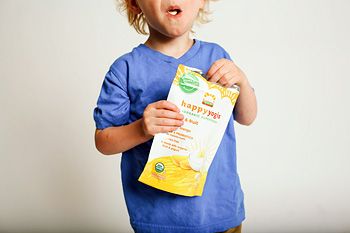Organic joy: Jessica Rolph helped food company's idea blossom

Jessica Rolph '97, MBA '04, founding partner and chief operations officer of organic foods company Happy Family. Photo: Ampersand Studios.
Jessica Rolph '97, MBA '04, says that when you love an idea as much as she does, it doesn't seem so crazy to be blending new veggie smoothie recipes in your kitchen at 2 a.m. Or standing outside a dilapidated warehouse that's supposed to be your new production facility and still thinking there's hope. Or even sharing an apartment with complete strangers to save money for your company.
"I'm passionate about healthy food and nutrition, and I just get so energized and excited about seeing a great idea transform into something real," says Rolph, founding partner and chief operations officer of Happy Family, a maker of organic foods. "Every product that we launch, every new account we get, the way we're building our company culture -- I love growing those things."
Rolph said her undergraduate education in anthropology in the College of Arts and Sciences brought out "her best self" and gave her confidence to discover what she truly loved to do.
"I was exposed to so many different types of people, so if I had an interest in something, I could find someone to talk to about it," she says.
After graduation, she worked as a paralegal and in political consulting, eventually developing an interest in business -- particularly socially responsible businesses like Honest Tea and The Body Shop, which focused on fulfilling a mission while making a profit.
Returning for her MBA, she took courses in food industry management and joined BR Ventures (Cornell's student run venture capital fund), learning about startup financing and legal considerations for new companies.

Last summer, Happy Family, which had more than a 4 percent share of the U.S. baby food market, was acquired by Group Danone, owner of the Stonyfield Farms, Evian water and Activia yogurt brands. Photo: Ampersand Studios.
During the Case Studies in Entrepreneurship class, Rolph "heard the stories of real entrepreneurs, their ups and downs and their personal stories. That helped shape for me the vision I had for my future," she says.
Her introduction to Happy Family founder Shazi Visram came about by chance, after a colleague mentioned Visram's name and Rolph called her to chat.
Visram had already been working on an idea for an organic baby food company for three years and launched the company in 2006.
The pair started with an idea for fresh baby food (later changed to frozen), received a $10,000 grant from the Eileen Fisher Foundation for women entrepreneurs, worked their own production line, pleaded with a production company, walked the aisles of Target giving away samples to moms, and raised $20 million over the next six years.
And it paid off.
In 2011, Happy Family was named the top growing food company by Inc. Magazine. By 2013, the company had more than a 4 percent share of the U.S. baby-food market and was generating gross sales of more than $90 million. Last summer the company was acquired by Group Danone, owner of the Stonyfield Farms, Evian water and Activia yogurt brands.
"In seven years, we went from a struggling startup to something really big," Rolph says. "We were so persistent. We were never willing to give up. We completely believed in our big idea."
Another key to success, she explains, was their ability to adapt as they learned more about the market, their product and their customers.
"We zigged and zagged and were always thinking about how we could get at this market in a different way," she says. "And oftentimes, we just had to put one foot in front of the other and not be afraid of failure. It's in failures that you really learn how to succeed."
Although the company has been sold, Rolph's role has stayed the same.
"Nothing that's good has been changed; we've just added an extra layer of resources and knowledge," Rolph says. For example, Danone already has conducted studies on factors that lead some batches of carrots to be sweeter than others, a question she always pondered. "It's like having a parent who is so supportive and has already been through so much," she says.
Kathy Hovis is a writer for the College of Arts and Sciences.